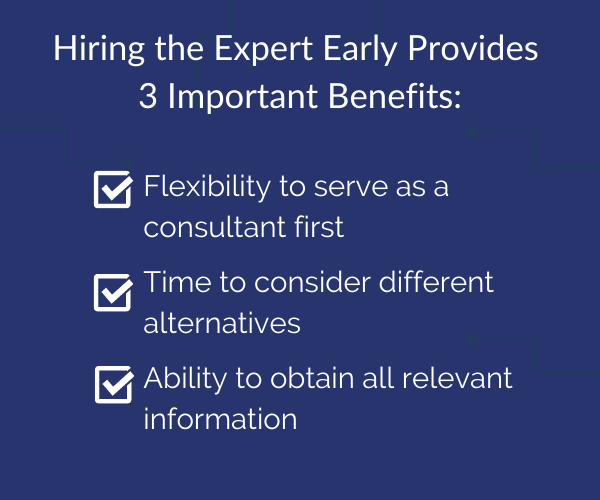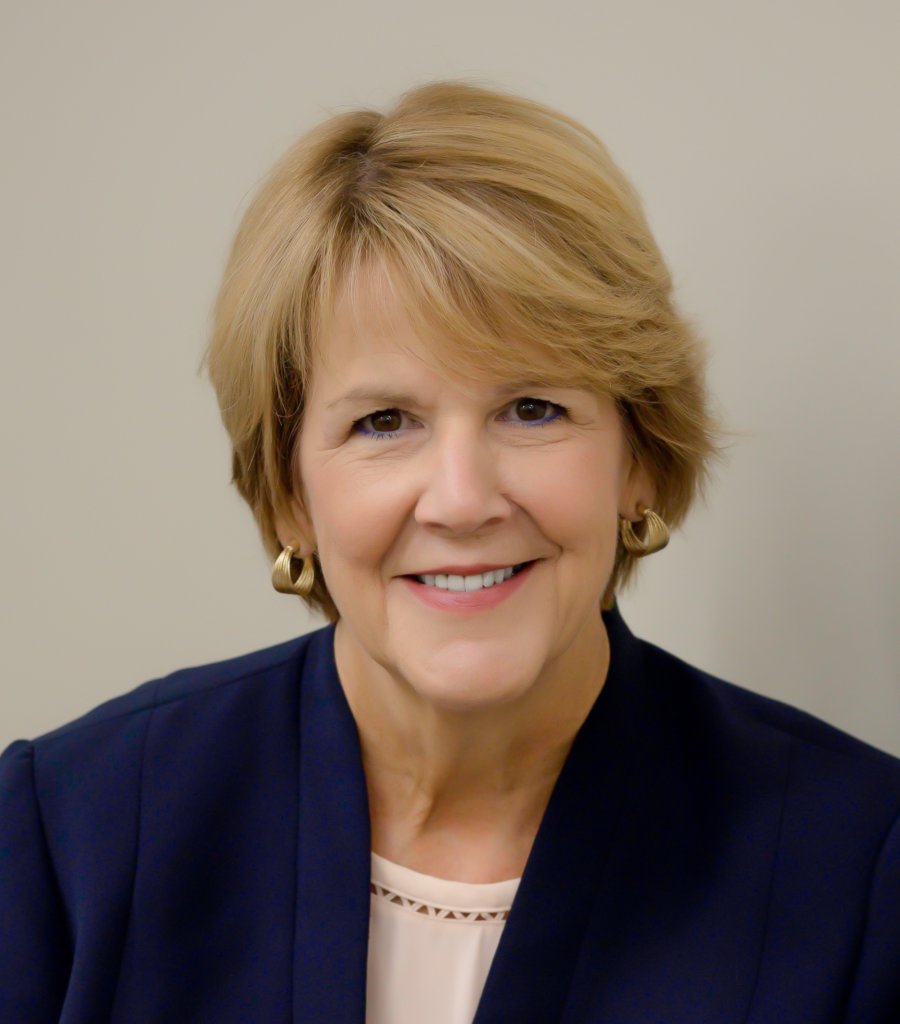
Article 1: When to Hire a Financial Expert
The question of when to hire a financial expert is a critical element of any litigation case involving business valuation or financial damages.

In short, the best time to engage a financial expert is before you are required to disclose them as an expert. In this article, we take a closer look at how the timeline of hiring a financial expert can positively or negatively impact your business litigation case.
In our experience, hiring a financial expert early works to the attorney’s and the client’s benefit. Of course, early on it is anticipated and hoped for that the parties will settle. This, combined with the client’s fee sensitivity, often leads to counsel postponing the hiring of the damages expert. While understandable, too often waiting to hire an expert in an attempt to save the client money can actually come at a significant expense. Hiring the expert early gives you important options that can be beneficial to your client.
Hiring the Expert Early Provides 3 Important Options
- 1. Flexibility to Serve As a Consultant First: Hiring the expert as a consultant first provides the flexibility to consult on different approaches and what-if alternative damage theories or calculations. Most often, this work is not discoverable and gives you and your client the flexibility to either disclose this consultant as your expert or choose to look elsewhere for a different expert.
- 2. Time to Consider Different Alternatives: Rarely is there only one way to determine damages. The financial expert’s knowledge in accounting, business, and finance can help you develop and test your theory of damages. The impact of being able to “what if” different scenarios should not be ignored. Critical questions can be evaluated such as whether a loss is due to the damaging event, or is it rather a supply chain issue, an industry-wide issue, or are damages more likely attributable to some other root cause? To achieve this, however, the expert needs adequate time to obtain and become familiar with the underlying facts and supporting documents of the case.
- 3. Time to Obtain Relevant Information: There is nothing more frustrating for all involved than to see “what could have been” had there been time to work with counsel and client before deadlines loomed and windows of opportunity closed. In too many cases, an expert is brought in late and needs important documents the attorney wasn’t aware would even be relevant. If discovery is closed, the expert can’t always get the information that can support exploring different approaches to calculating damages.
Having a financial expert on board early means there is time to request all needed information, documents, and data that could shine a light on damages that may not have been considered yet. The expert can also assist in adding questions to depositions, thereby providing needed information given under oath. The information and data that counsel deems relevant is sometimes quite different from that of the financial expert.
As an attorney, you are hired as an advocate for the client, whereas the financial expert needs to be independent—taking an objective view of the possible approaches to damages. Avoid making the common mistake of bringing in an expert late in discovery to support a conclusion you’ve already calculated regarding damages. More often than not, hiring someone for a “seal of approval” at the 11th hour backfires.
Case Study: What Could Go Wrong By Waiting Too Long to Hire an Expert?
Here is an example of a situation where discovery was closed by the time we were brought on board. The attorney waited to contact us because they thought the case would settle and they were trying to save money; however, it wound up costing the client.
The attorney on the case had asked for tax returns and financial statements, assuming this was enough for a business valuation. Once we got involved, we had the experience to realize that with more detailed reporting—for example, if we had been able to drill down into the detailed vendor reports, production reports, parts orders, and payroll records—we could have made a stronger argument for a different damages conclusion. But discovery was closed by the time we were hired, so we couldn’t access those critical documents that would have supported a different conclusion.
Little is more frustrating for a financial expert than being brought in late on a case and discovering the window of opportunity to explore different ways of calculating damages has been missed. This can have serious limitations on the level of damages that can be argued and supported.
We’re Here to Help
When financial experts and litigation attorneys work together and understand how our respective backgrounds and skills can complement one another, we form an effective working relationship that allows for the consideration of more options.
Based on our firm’s 45+ years of experience focused entirely on valuing businesses and determining damages in business litigation, we can provide insight, experiences, and ideas for ways to approach the financial portion of your litigation project that you may not have encountered yet.
We can assist in ensuring you understand all the relevant financial concepts and vocabulary. Just as there are legal concepts and words that can stump non-attorneys, business and business valuation include specialty components of economics, accounting, and finance that can strengthen your case once you’re aware.
Stay tuned to your inbox and follow Capital Valuation Group on LinkedIn (link) as we share more from this series on how to successfully navigate each phase of working with a financial expert in the litigation process. If you have a particular situation you would like to discuss, feel free to give us a call. We are happy to have a complimentary initial discussion.
Would you or other people in your firm find value in this series? Subscribe to our email list here.

Cathy Durham is a principal of Capital Valuation Group, Inc., headquartered in Madison, WI. Capital Valuation Group has been helping business owners across the country understand, increase and unlock the value of their businesses for over 45 years through keynote speaking, valuation analysis, determining damages and providing expert witness testimony. Cathy welcomes conference and event speaking inquiries and can be reached at cdurham@capvalgroup.com. Phone 608-257-2757
